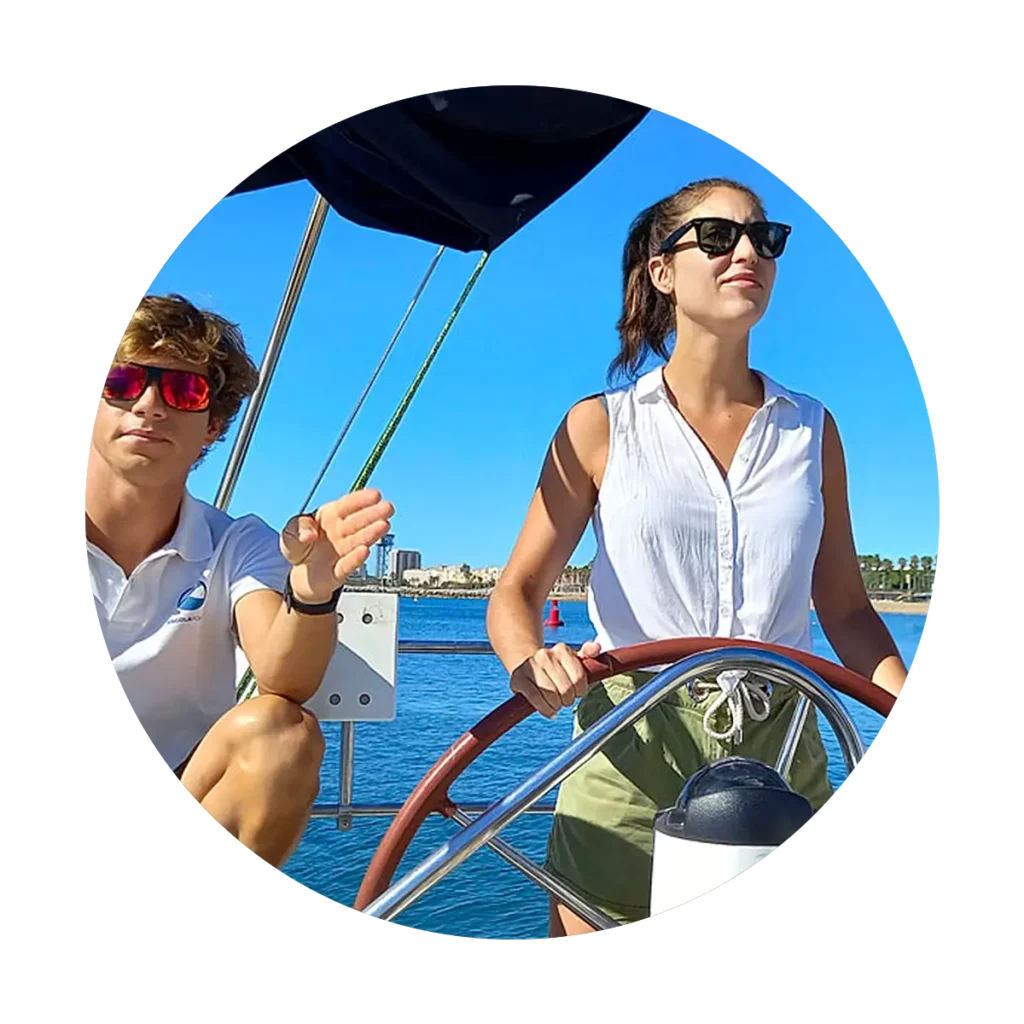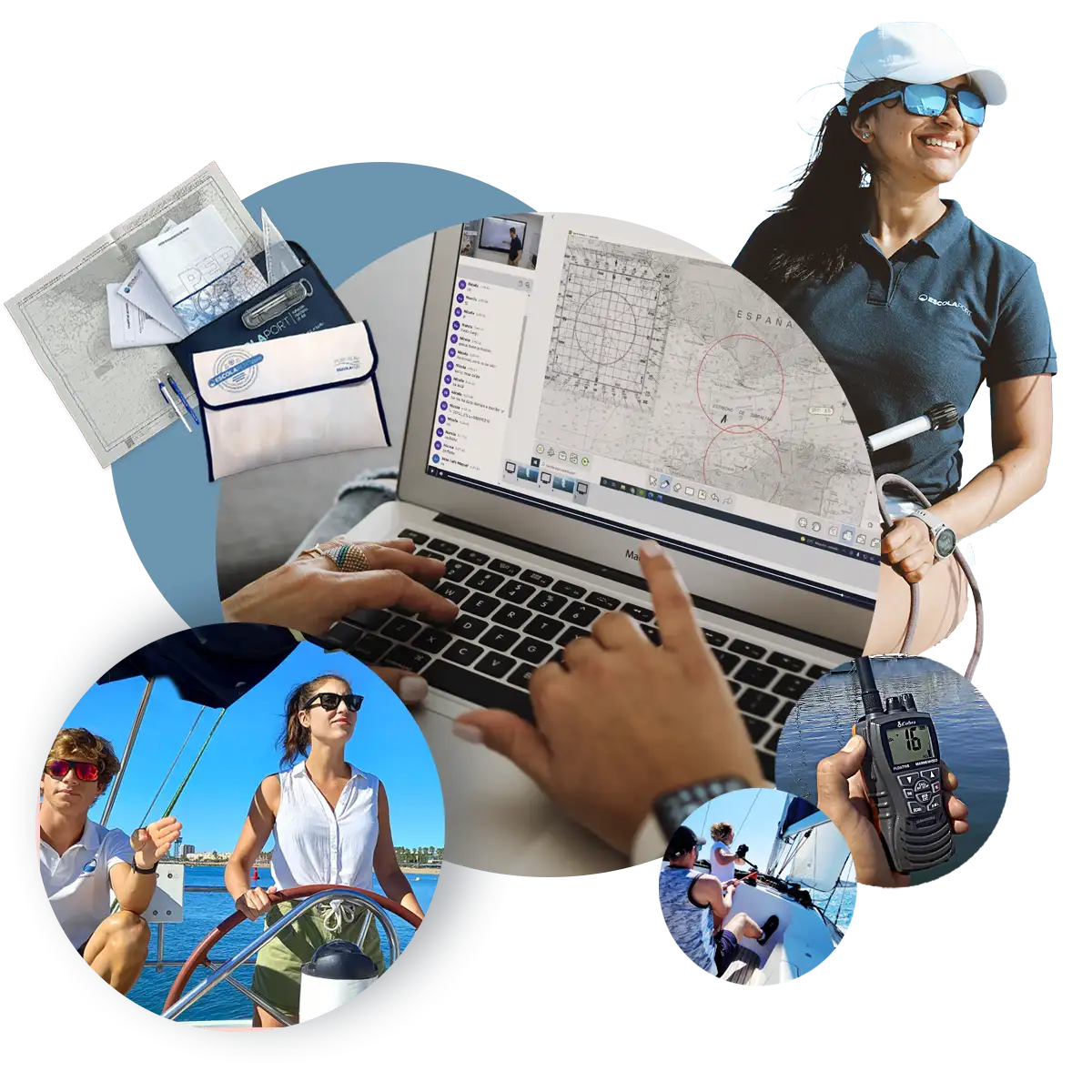
PER course, two classes in one weekend
In 16 hours, in person or via streaming, we will explain the entire syllabus and give you the keys to passing. the exam in the first
Be 18 years or older
To sign up for the PER exam or do the practices you must be of legal age.
If you are 16 years old you can take it off PNB.
Pass a theoretical exam
Official exams are held almost every month in Catalonia.
At EscolaPort we schedule theoretical courses on dates close to each call.
Complete the practices
In addition to passing the exam, you must do 2 compulsory practices: Navigation 16 hours Radio operator 12 hours.
You can do the practice before or after the exam.
Expand attributions?
If you want to steer sailboats, sail to the Balearic Islands or on boats up to 24 meters long, in addition to the mandatory ones, you must do complementary practices.
If you do the complementary practices after having issued the degree, you must request a new issue to include the new attributions.
Pay fees
Examination
Registering for the exam requires payment of the registration fee.
And the registration in the corresponding call within the period indicated.
expedition
To process the title you must pay the issuing fee.
When you have passed the exam and the practicals.
Nautical medical certificate
When you go to process the issuance of the title you must pass a psychophysical examination and attach it to the application.
Only what is done in centers authorized by the DGT is valid. Once completed it expires after 90 days, it is important that you get it after passing the exam and the internship.
Deadlines
To sign up for an exam there are specific deadlines, which you can consult at Port School, on the website of the Generalitat de Catalunya or in your CCAA.
To request the issuance of your degree, the maximum period will be 24 months from the date on which the exam notes are published.
In the same way, the period of 24 months counts from the date on which the internships have been passed. If you have not passed the exam, you have 23 months to do so and issue the degree.
Validity period
The PER title is valid for 10 years.
To renew it you must pay the corresponding fee and provide a medical certificate.

PER weekend course in Barcelona
Theoretical preparation course for the exam, in person or streaming, lasting sixteen hours.
On Saturday and Sunday, the entire syllabus will be explained in four sessions of 4 hours each.
Escola Port courses are taught in Spanish because we are lucky to have students from all over the peninsula, the Balearic Islands and the Canary Islands.
Daily schedule:
– Start at 10:00 a.m
– One-hour lunch break at 2:00 p.m
You can attend in person at Port Olímpic or connect from home to follow the streaming class.
Remember that, in addition to passing the exam, to obtain the PER title you must complete two internships:
– Navigation | Safety and navigation (16 hours).
– Radio operator | Short Range Radio Operator (12 hours).
With complementary practices, the attributions can be extended to steer sailboats, sail to the Balearic Islands and increase the length to 24 meters.
In Catalonia, more than eight PER exams are held each year. To register there are specific deadlines, and you must pay a registration fee through the website of the Department of nautical of the Generalitat.
Course study method PER weekend
In two days, we will explain the entire syllabus, give you the keys to pass the exam and do navigational chart exercises. To get the most out of your course, it is highly recommended that you review the syllabus before starting it.
The best way to face the PER weekend course is to prepare in advance and resolve doubts with the instructor:
– Read the syllabus.
– Take tests.
– Review the exams.
– Watch the videos of interest at aula.escolaport.com.
– Participate in streaming tutorials.
On the online course platform, aula.escolaport.com, you have access to all theoretical content, a library with exams and extra material, connection to classes and tutorials, videos, tests and recordings of classes and tutorials.
Tutorials
The streaming tutorials are consultation and support sessions where your instructor will solve your doubts related to the syllabus.
You can participate through the chat or by activating your microphone.
Every week, for two hours, you can connect and ask your questions. If you can't attend live, you can send your questions in advance and the day after the tutorial you can watch the recording.
PER Weekend
Theory in two days.
Includes:
- 16 hours of theory, streaming or face-to-face.
- Practical safety and navigation.
- Radio operator training.
- Streaming tutorials.
- Online teaching material.
- Insurance and VAT.
Attributions of the title PER
15 meters
Steering motor recreational boats up to 15 meters in length.
12 miles
Sail away from the coast up to 12 nautical miles.
Jet skis
Rule all kinds of jet skis with no power limit.
Sailboats*
Steering sailing boats.
*Additional practices.
Navigation to the Balearic Islands*
Sail between the peninsula and the Balearic Islands. Increase the length to 24 m.
*Additional practices.
Professional services*
Transfers, transport of goods, lifeboats...
+ Basic safety training.
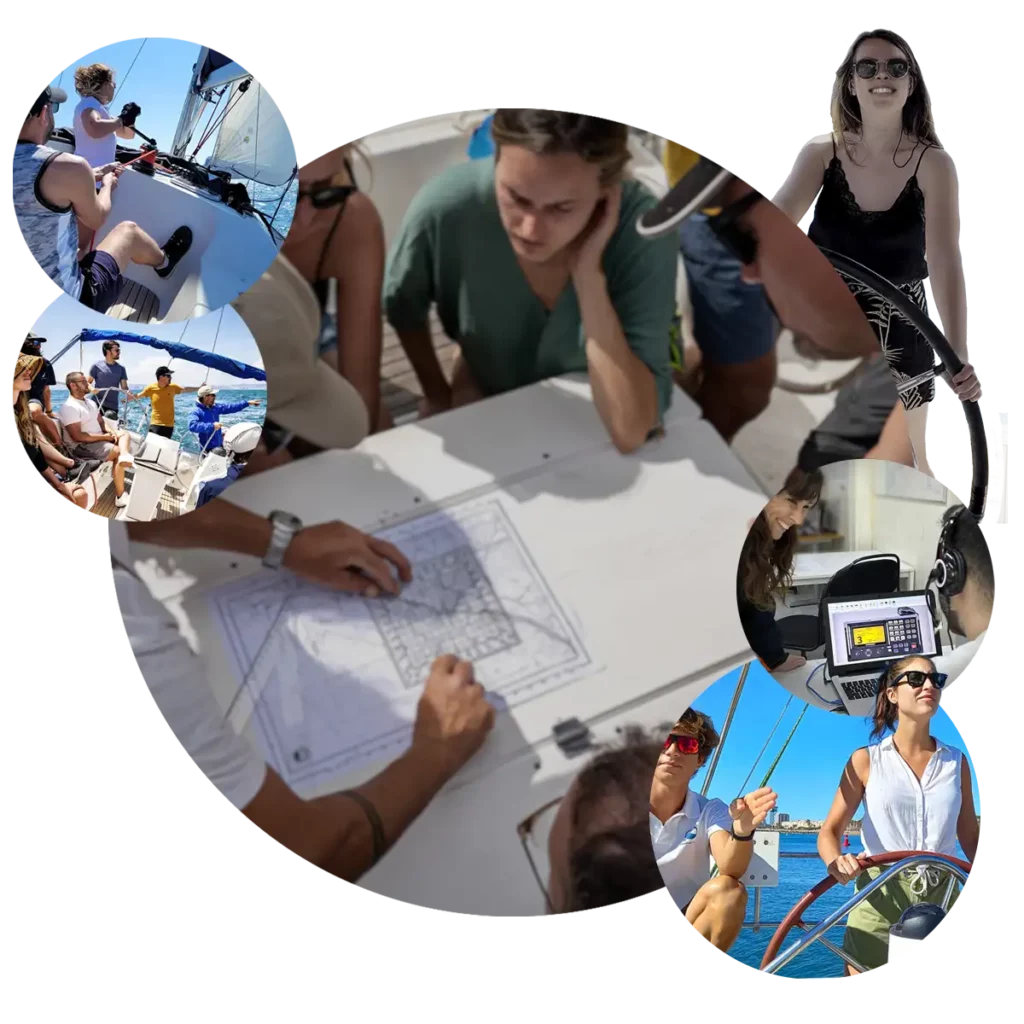
PER · Practices at the Port Olímpic of Barcelona
The practices of security and navigation, and the formation of radio operator, you must complete them to obtain the PER with basic attributes.
You can complete the internship before or after the exam.
You can expand your powers to steer sailboats, sail to the Balearic Islands and extend the length to 24 meters, by doing complementary practices.
Safety and navigation practices
With your practice group you will carry out several exercises in port and open sea. You will learn how to navigate safely, how to maneuver, anchor, the use of ropes and basic knots, and much more.
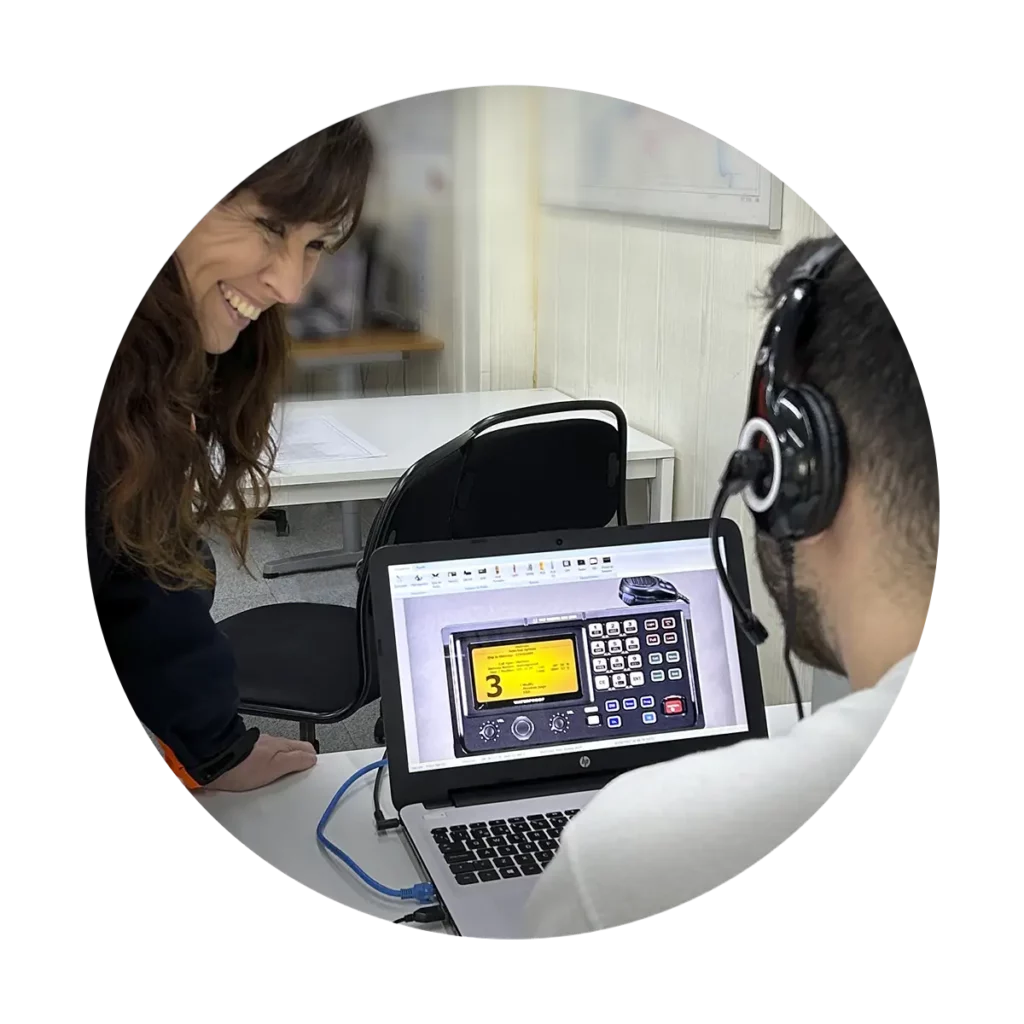
Short range radio operator
You will learn to operate the on-board radio, VHF equipment, radio beacons and other radio communication and navigation aid equipment. How to make distress, emergency and safety communications, and more.
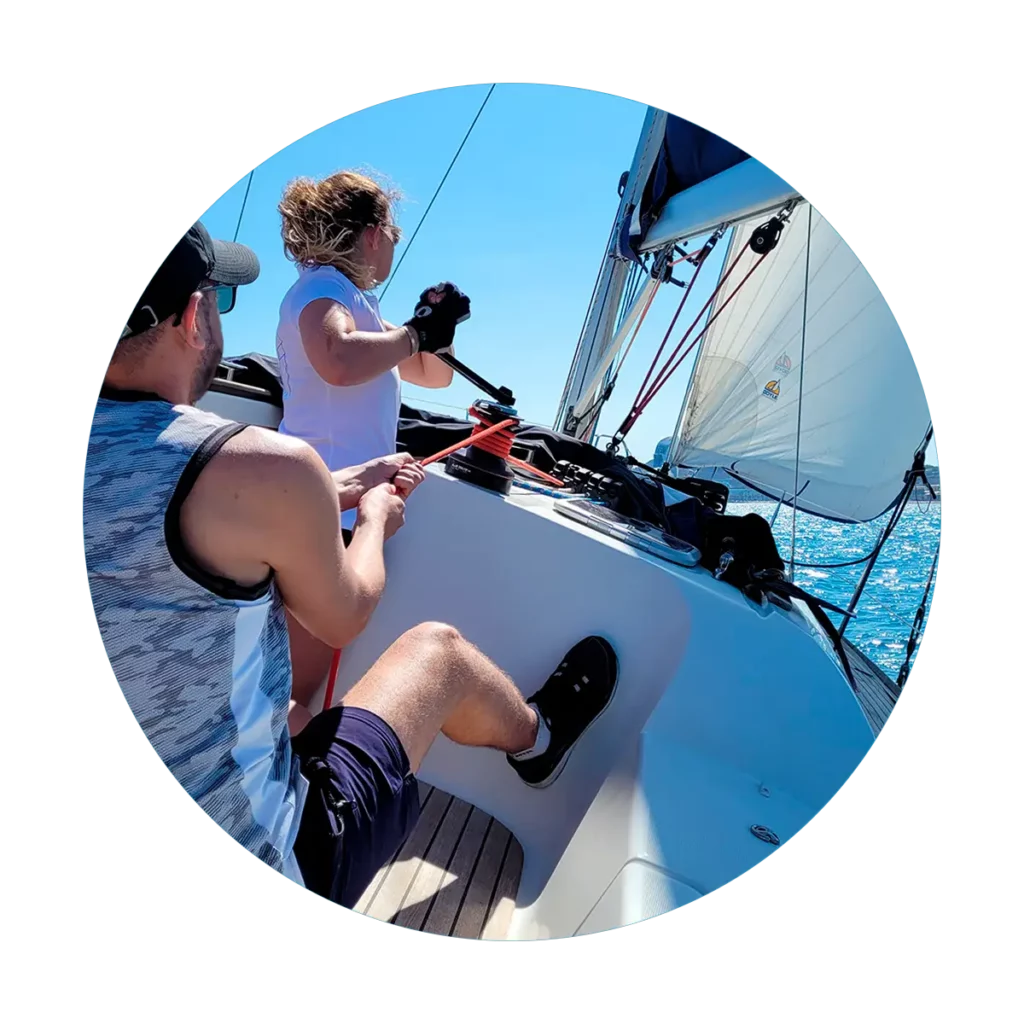
Sailing practices
Carrying out various exercises in port and open sea you will learn how to sail safely, how to maneuver, anchor and the use of basic ropes and knots.
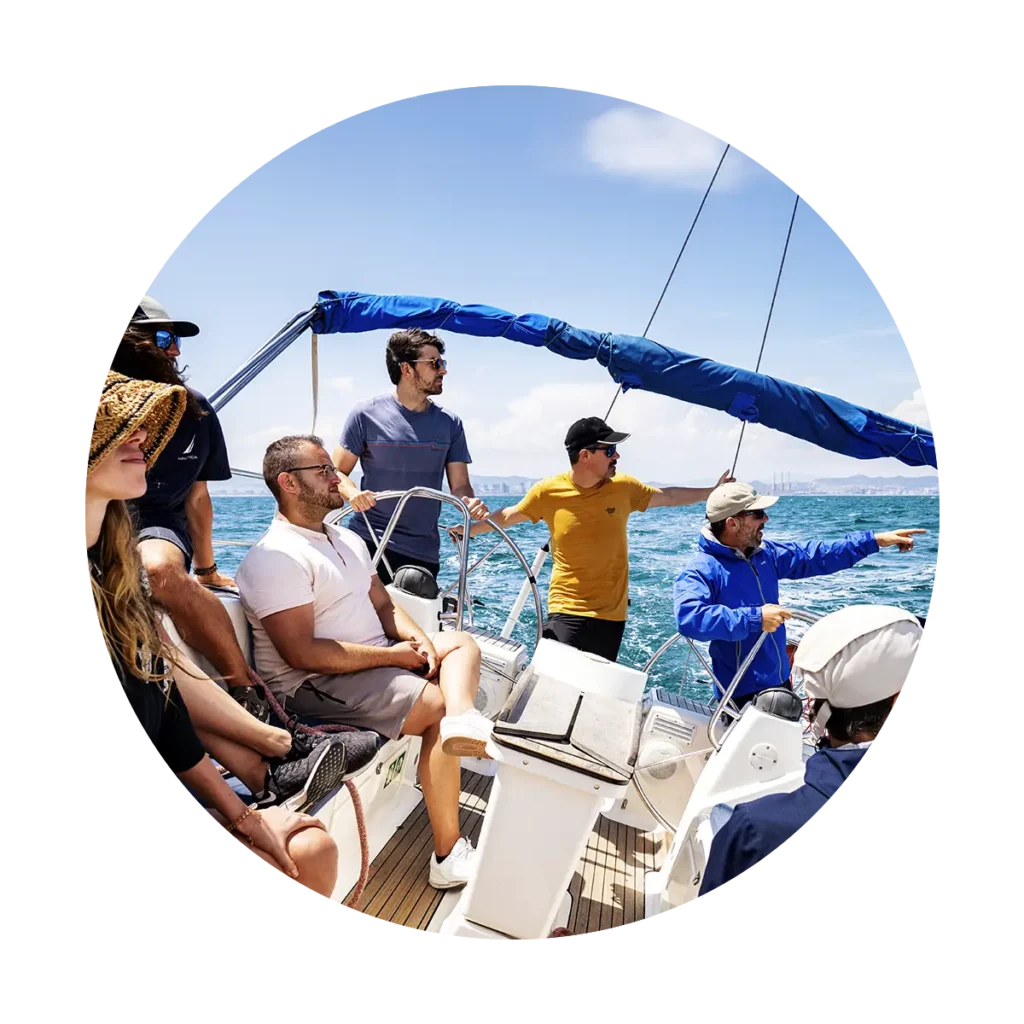
Navigation practices to the Balearic Islands
During the 24 hours of navigation in the Catalan Mediterranean, you will learn to navigate safely on long crossings that include night navigation.
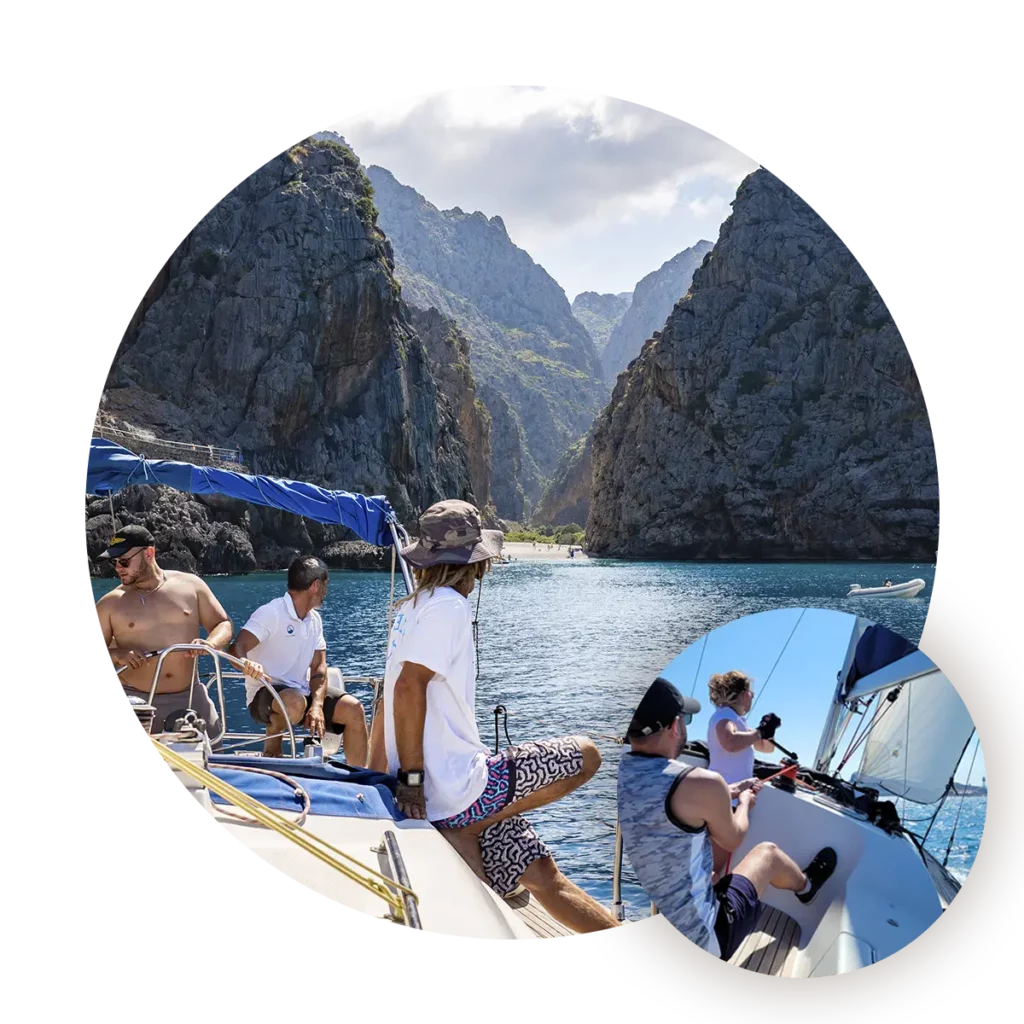
Sailing practices in the Balearic Islands + Sailing
In the 48 hours of sailing on a crossing, from Barcelona to the Balearic Islands, you will learn how to navigate safely on long crossings that include night navigation in addition to learning how to navigate safely on sailing boats.
If you don't have time during the week, this is the course for you.
The PER – Weekend course takes place on dates close to the exam official with the aim that you arrive with the best preparation and with fresh knowledge.
You can complete the internships, before or after the course, during the week or at weekends.
2 theoretical classes
Face-to-face classes at Port Olímpic or streaming.
Saturday and Sunday
10 a.m. to 2 p.m. and 3 p.m. to 7 p.m.
Online platform
Comfortable and intuitive: online tests, streaming classes, interesting videos, video classes, mock exams, inquiry channel.
Unlimited tutorials
Before and after the course, send your questions and every week you can connect to the streaming to solve them with an instructor.
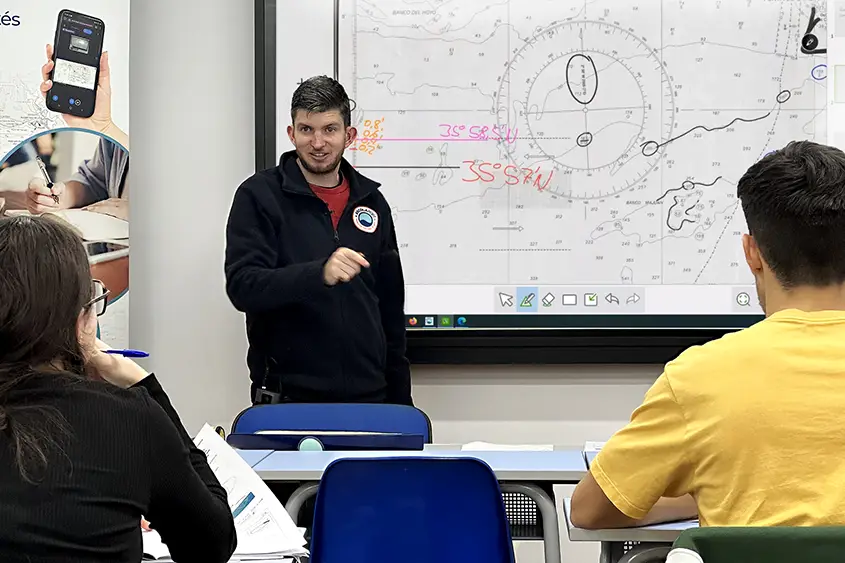
2 face-to-face classes in our Port Olímpic classrooms
During a weekend, your instructor will guide you so that you can assimilate and understand the syllabus easily and thus be able to pass. the exam in the first
The lessons are recorded and available the next day in the virtual classroom.
Schedule:
Saturday and Sunday from 10:00 to 14:00 and from 15:00 to 19:00.
2 streaming classes in the virtual classroom
The classes are broadcast live and you can watch them, from a computer or smartphone, at aula.escolaport.com.
During a weekend, your instructor will guide you so that you can assimilate and understand the syllabus easily and thus be able to pass. the exam in the first
The lessons are recorded and available the next day in the virtual classroom.
Schedule:
Saturday and Sunday from 10:00 to 14:00 and from 15:00 to 19:00.
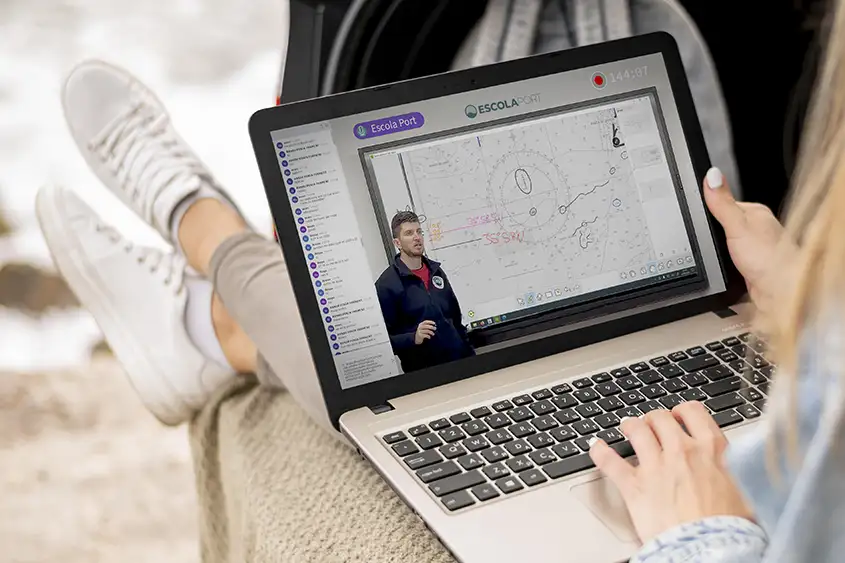
4 pm – Navigation practices
In the calendar you can reserve dates to do the safety and navigation practices on another weekend or during the week.
On board the boat through various exercises in port and open sea you will learn how to navigate safely, how to maneuver, anchor and the use of basic ropes and knots. You will review navigation chart exercises, mark courses and learn how to position yourself on the chart.
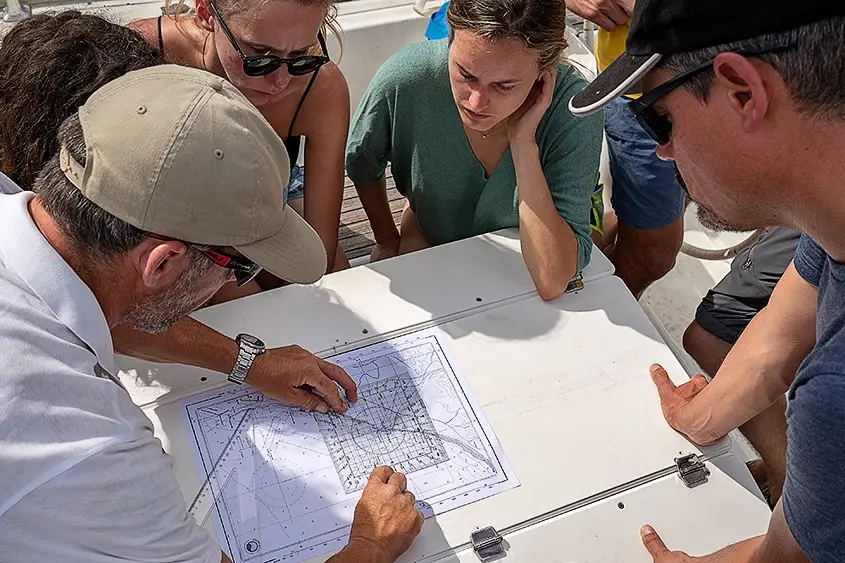
Radio operator practice
In the calendar you can reserve dates to do the Short Range Radio Operator training, another weekend or during the week.
In comfortable air-conditioned classrooms, with state-of-the-art simulators, you will do the practical part of the Radio Operator course.
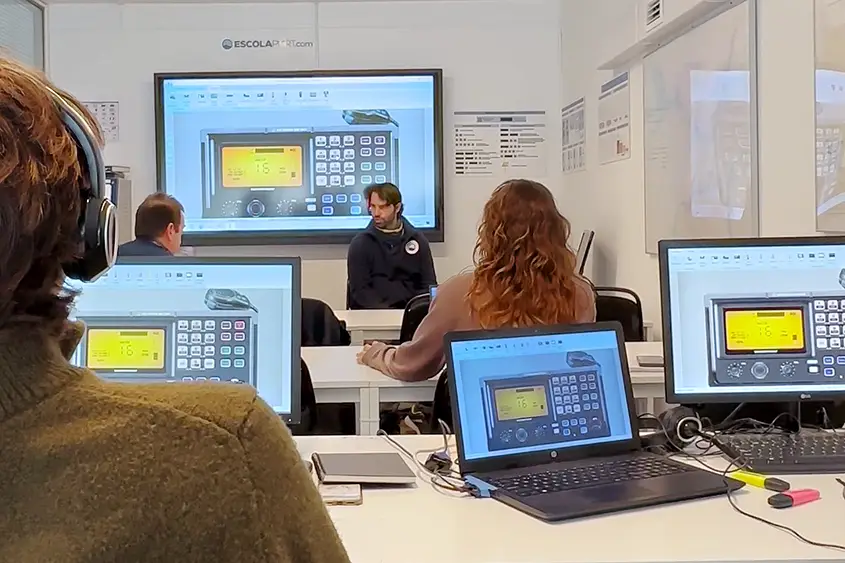
Sailing practice
You will learn how to sail safely, how to maneuver, anchor and the use of ropes and basic knots.
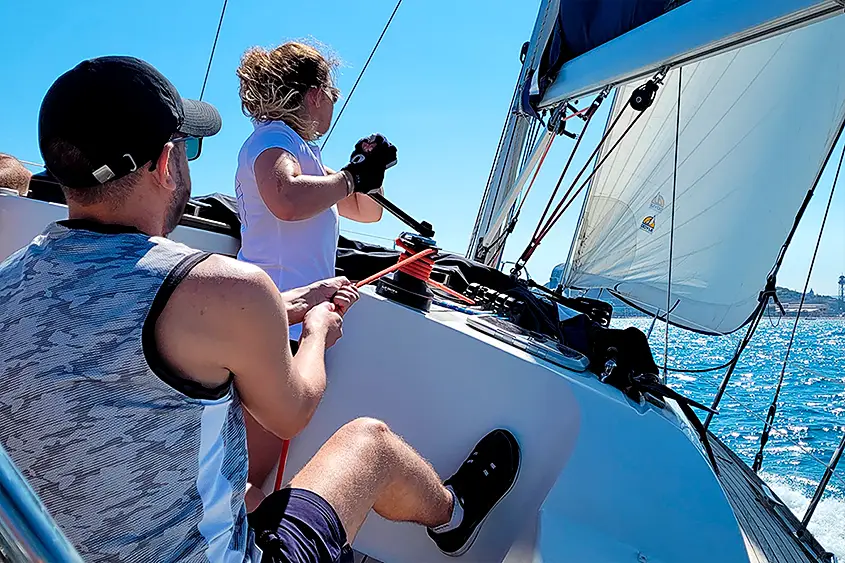
24 h – Sailing practice to the Balearic Islands
On a 24-hour crossing, we will sail up to 20 miles from the coast in the direction of Tarragona or the Costa Brava, and we will work on aspects of sailing mainly oriented towards the crossing, safe night sailing.


48 h – Sailing practice Balearic Islands + Sailing
On a crossing to the Balearic Islands, departing from the Olympic Port of Barcelona, you will do both practices at the same time.
What is the title?
Your nautical certificate will be a PDF document.
You can download it, from your personal space, in the application of the nautical department of the Generalitat de Catalunya.
There are neither physical titles (carnet, folio, etc.) nor provisional ones, only the definitive title.
To process it, you will simply have to pay the corresponding fee and upload your medical certificate to the application.
You can do the expedition once you have completed the internship and passed the exam.
Both the exam pass and the practicals will be registered in the computer system, you will not need any document or proof.
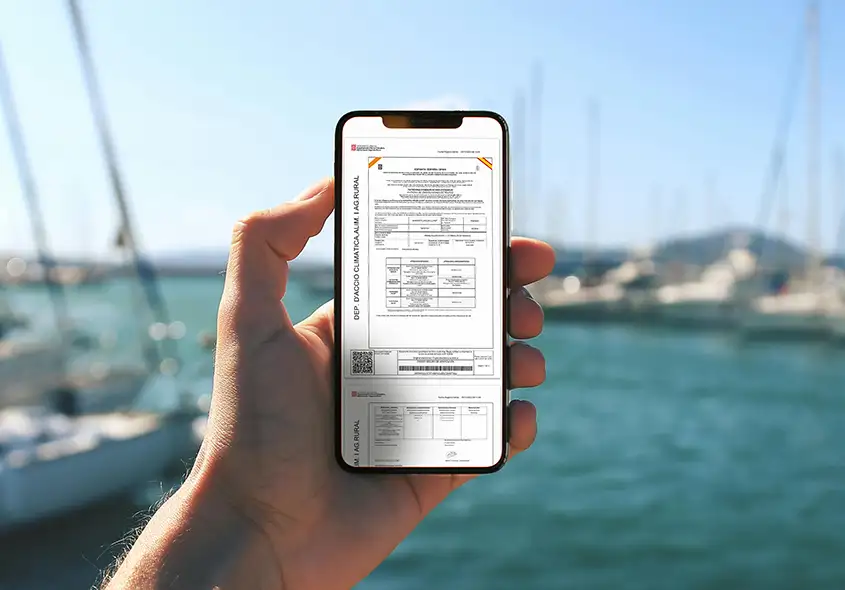
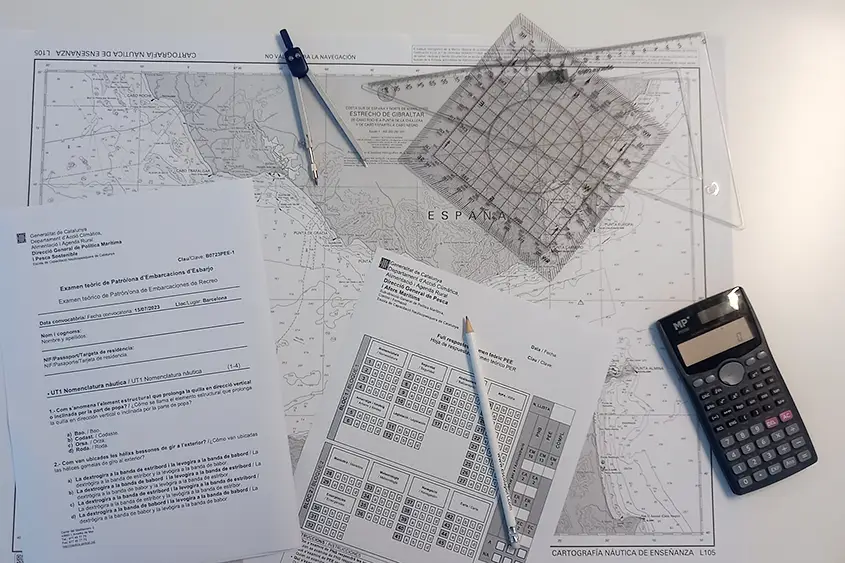
Exam PER
- duration: 1 hour and 30 minutes.
- questions: 45 in total, with a minimum of 32 correct answers.
- Syllabus: 11 units.
- Whether for the basic PER, sailing or Balearic Islands, the exam is the same.
- You must bring the instruments to do the navigation chart exercises.
- It does not include questions about internships.
- The exam is bilingual, Spanish/Catalan.
If you have difficulties with the language, you can bring a printed term translator on the day of the exam.
PER theoretical course content
Here are the 11 topics you will be asked about in the exam. The first six subjects are common with the PNB.
All the units are related, understanding them as a whole is essential for optimal training.
In each topic you will learn:
Identify and name the different parts and elements of the ship. Know and name navigation concepts, notions and expressions.
Identify and name the different mooring and anchoring parts and elements. Know and name concepts, notions and expressions associated with the anchoring maneuver. Know the requirements, conditions and procedures to carry out an effective and safe mooring or anchoring maneuver.
Prepare your boat before each departure. Know what precautions you should take in the face of bad weather. Keep the boat stable against any change in weather. Know which safety elements are mandatory to bring on board in your navigation area. What to do in case of: fire, person in water (all maneuvers), attend to an injured person on board, tow to a boat, call Salvament and Radio-Medical Service.
Identify the different regulatory bodies. Know the regulation and basic regulations in the maritime sector. Know the limitations to navigation near the coast. Know the basic aspects of permitted and prohibited discharges at sea. Get to know the protected areas of the Mediterranean.
Identify the regulations applicable to maritime signaling. Identify the regions of the world that have the same beaconing system. Know all the brands in the ports and navigable waters. Identify the different brands and what to do when you see them. Know the different rhythms and colors of the brands' lights.
Know the traffic rules with normal and reduced visibility. Recognize when there is a risk of collision and what maneuvers to perform. Know how to get a boat. Know how to avoid tackling in different situations. Passing preferences according to the type of ship/vessel. Recognizing, by its lights, a ship and its situation. Identify the acoustic signals emitted by ships/vessels during manoeuvres/warnings/reduced visibility. Recognize danger signs.
Understand, theoretically, the factors to take into account when maneuvering the boat. Develop a mental scheme of how each maneuver is carried out for different situations. Master the vocabulary related to the handling of heads and moorings.
Know the procedures to act in cases of personal accidents. Know by heart the means of contact to request assistance. Know how to react and proceed in cases of stranding, breakdowns or collisions. Know the conditions in which a fire can occur, how to avoid them and how to extinguish it. Know what to do if you have to abandon ship.
Know where to get a reliable weather report. Know how to interpret the information from the weather reports according to the Douglas and Beaufort scales. Understand what they are, how they occur and how squalls and anticyclones move. Recognize coastal breezes. Understand how the swell is generated. Know scales and measuring instruments.
Understand the terms and concepts used in coastal navigation charts. Read and interpret all the symbols on a navigation chart. Theoretically understand how to position yourself at a specific point on a navigation chart.
Knowing how to locate yourself at sea by means of a chart and reference points on land. Get coordinates on a chart. Measure distances and convert them to different units of measurement. Draw directions on a chart and make the necessary corrections to reach the desired point. Calculate distances, times and speeds.
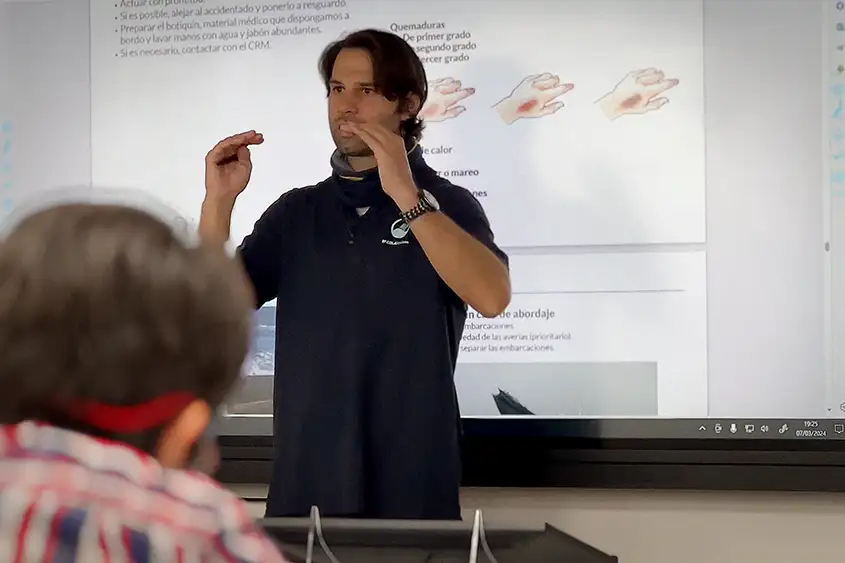
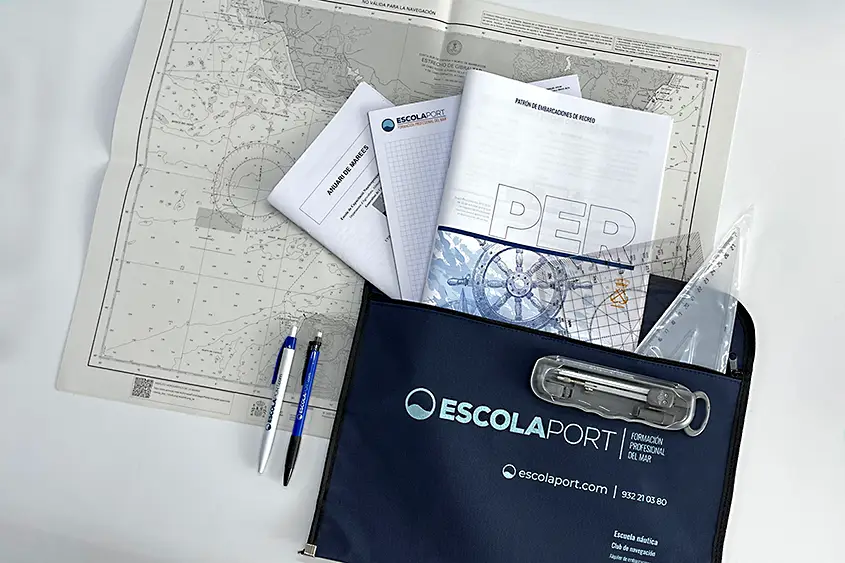
Teaching material for the PER course
To prepare for the theoretical part of the Recreational Boat Skipper title (PER), you have access to all the content online.
But what about the nautical chart? For this practical part, you will need specific material. Escola Port We offer you three options, so you can choose the one that best suits you:
– Printed study guide (syllabus).
– Nautical charts*.
– Yearbook of tides.
– Protractor of angles.
– Point compass.
- Cartabó
– Notebook
– Pencils
– Pen
*Navigation charts, L 105 official exam model (strait chart). Size 60 x 44 cm.
– 4 nautical charts*.
– Protractor of angles.
– Point compass.
- Cartabó
– Notebook
– Pencils
– Pen
*Navigation charts, L 105 official exam model (strait chart). Size 60 x 44 cm.
– 10 nautical charts* for UT 11 exercises.
*Navigation charts, L 105 official exam model (strait chart). Size 60 x 44 cm.

Official exam in Catalonia
The exam assesses the theoretical knowledge of the content of the 11 units of the syllabus.
The APTE in the exam is valid for 24 months.
The exams are called in Catalonia by the Generalitat and there are eight calls a year.
You can sign up for the exam you prefer voluntarily, the school will not register you for the exam without your formal authorization.
It is not mandatory to sign up for the one that coincides with the theoretical training.
There are specific deadlines for registering for the exam, after a certain date you will no longer be able to appear and you will have to wait for another call.
To take the exam, in addition to registering for the call of your choice, you must pay a registration fee on the website of the Generalitat's nautical department.
– The exam is usually held at the weekend, in a public institute.
- A few days before each call, the list of admitted candidates is published.
– You choose the call, but until the list is published you will not know the place, day and time when you have to appear for the exam.
Exam dates and details
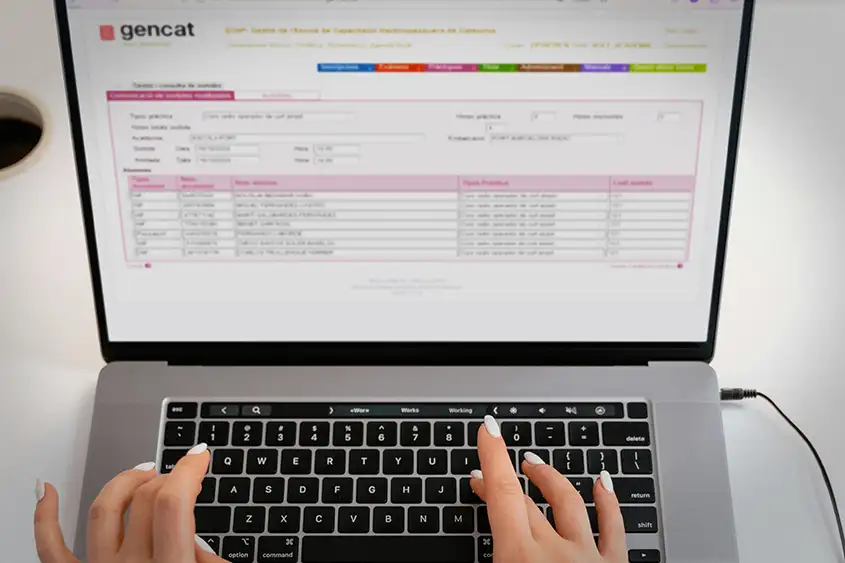
Registration of practices
At Escola Port, we take care of registering all your internships in the Generalitat's computer system.
The APTE in practice is valid for 24 months.
Once completed, the validation of these practices is carried out within four days.
When it's time to issue your degree, simply select the internships you've completed from the available options in the web application.
If your exam is from another Autonomous Community, you can request a practice certificate.

Procedures
The fees and administrative procedures to register for the exam and issue the PER degree are around €150.
You can manage it directly with the Generalitat de Catalunya or delegate these processes to the school.
The examination fee gives you the right to appear for a call. The price in general is around €75.
You can delegate this process to the school by paying a management fee.
To process the title, either for the first time, renewal or extension of attributions, you will have to pay a fee of around €65.
You can delegate this process to the school by paying a management fee.
When you go to process the issuance of the title you must pass a psychophysical examination and attach it to the application.
Only what is done in centers authorized by the DGT is valid. Once completed it expires after 90 days, it is important that you get it after passing the exam and the internship.

Official exam tests
At aula.escolaport.com test your knowledge and set the pace of your learning with online tests organized by topic.
Quizzes are automatically and randomly generated with hundreds of exam questions, you'll always take a different quiz!
Unlimited streaming tutorials
Every week, before, during and after the course, you will have your instructor at your disposal to solve your doubts about the syllabus.
Send your questions in advance and if you can't participate live, you can watch the recording the next day.

Course calendar PER weekend in Barcelona
| Dates | Mode | |
|---|---|---|
|
Sat. 10/05 to sun. 11/05
Saturday and Sunday |
In person / Online | |
|
Sat. 05/07 to sun. 06/07
Saturday and Sunday |
In person / Online | |
|
Sat. 13/09 to sun. 14/09
Saturday and Sunday |
In person / Online |
Taking a course at EscolaPort always has advantages
- Discounts on your next courses.
- Two free trips with the sailing club, when you buy your first pack of trips.
- All in one place, the Olympic Port of Barcelona.
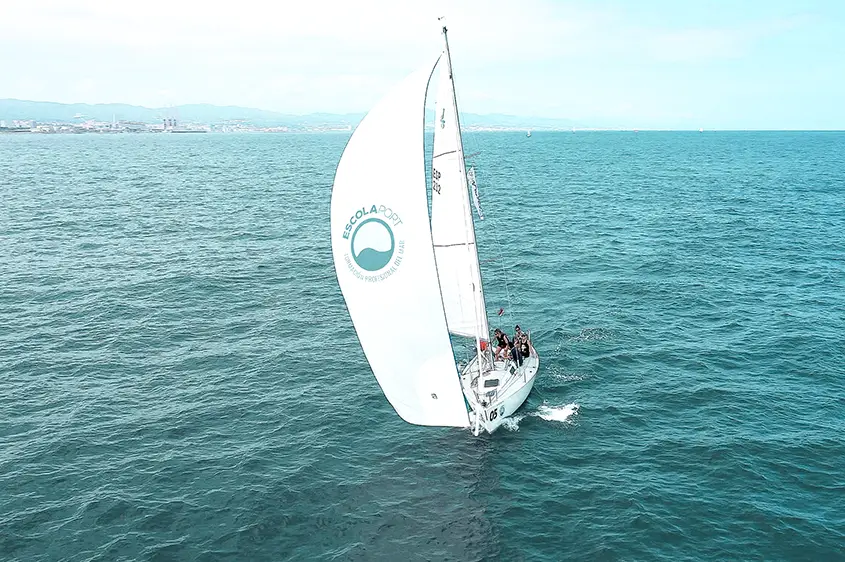
Frequently asked questions about the PER weekend course
What is the difference between the weekend PER course and the intensive PER course?
The time of dedication.
For the PER weekend course (depending on how you organize it) you can take between three and four weeks to complete it, doing the theory in one weekend and the practicals in another two.
In the intensive PER course you do theory and practice, in four days from Monday to Thursday.
Are two days enough to prepare for the PER exam?
Our recommendation is that you book the course in advance and start reviewing the syllabus as soon as possible. In this way, when you come to the course you should already be familiar with the nautical terminology and other aspects necessary for the optimal development of the PER weekend course.
Studying the syllabus and taking many exam tests, as well as attending and participating in classes is the key to success.
